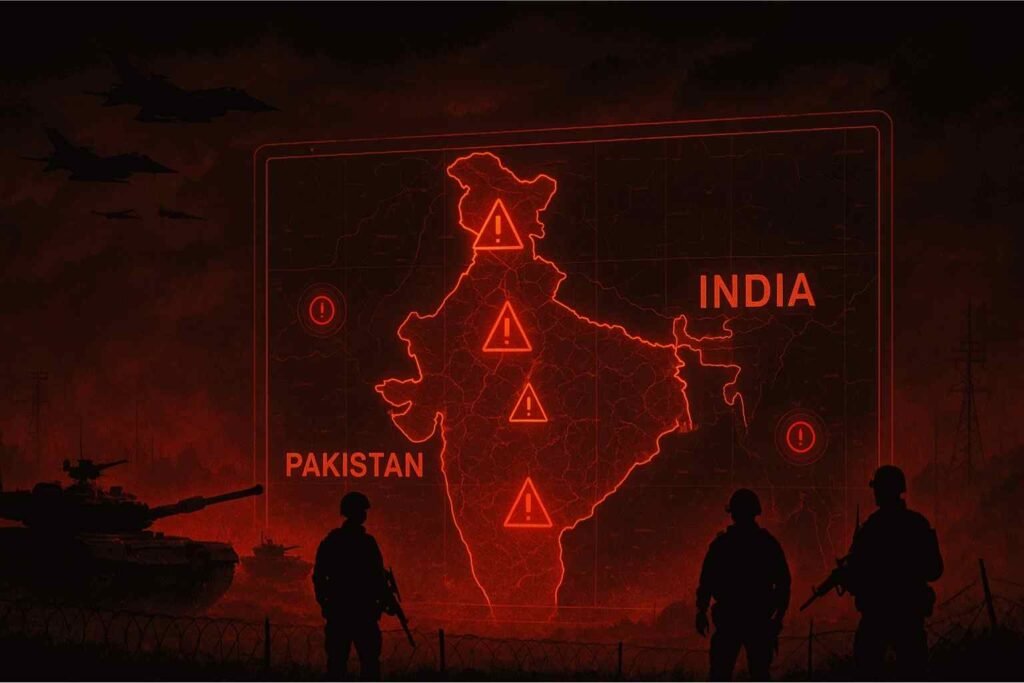
In the early hours of May 7, 2025, the world witnessed a dramatic escalation in tensions between nuclear-armed neighbors India and Pakistan. This conflict, rooted in decades of territorial disputes and security concerns, has now reached one of its most critical points in recent years. As global powers call for restraint, understanding the potential outcomes of this crisis becomes essential for international security and regional stability.
What Triggered the Current Crisis?
The spark that ignited the current standoff occurred on April 22, 2025, when militants attacked Indian tourists in the Baisaran Valley near Pahalgam in Indian-administered Kashmir. The attack, which claimed the lives of 26 people (mostly Hindu tourists), was initially claimed by a group called The Resistance Front (TRF).
India immediately accused Pakistan of supporting the terrorist group, a claim Pakistan vehemently denied. What followed was a rapid diplomatic breakdown:
- India suspended the Indus Waters Treaty, closed borders, and expelled Pakistani diplomats
- Pakistan responded by suspending the Simla Agreement, closing airspace, and implementing trade restrictions
- Small-scale military exchanges began along the Line of Control (LoC)
- Both nations mobilized military assets near their borders
The situation reached a new peak when India launched “Operation Sindoor” on May 7 – a series of missile strikes targeting what India claimed were “terrorist infrastructure” across several Pakistani cities.
Five Potential Outcomes of the Current India-Pakistan Crisis
1. Limited Military Engagement with De-escalation
The most optimistic scenario involves both nations limiting their military actions to the current level, followed by diplomatic intervention from global powers. With the United States, Russia, China, and the UAE all calling for restraint, there’s significant international pressure for de-escalation.
“Diplomacy and dialogue remain the most effective means of peacefully resolving crises,” stated UAE Deputy Prime Minister of Foreign Affairs Sheikh Abdullah bin Zayed Al Nahyan.
Such a scenario would likely involve:
- A measured Pakistani response to India’s strikes
- Diplomatic channels reopening through third-party mediation
- Gradual restoration of air travel and trade
- Return to pre-crisis diplomatic status
2. Prolonged Standoff with Economic Consequences
A more concerning possibility is a prolonged military standoff without full-scale war but with significant economic impacts. The crisis comes at a particularly vulnerable time for Pakistan’s economy, which recently emerged from economic distress and is working to shore up its $7 billion IMF loan program.
A continued standoff would likely mean:
- Extended border closures and trade restrictions
- Suspension of the Indus Waters Treaty affecting Pakistan’s water access
- Persistent military mobilization draining resources from both economies
- Foreign investment reduction in both countries
- Tourism impact, particularly in disputed Kashmir region
3. Controlled Military Confrontation
History suggests that India and Pakistan often engage in what analysts call “managed hostility” – military confrontations that remain below the threshold of full-scale war. Pakistan has promised to respond to India’s strikes “at the time and place of our own choosing,” suggesting a calculated response is being planned.
This scenario could involve:
- Pakistani airstrikes on Indian military positions
- Artillery exchanges along the Line of Control
- Limited ground operations in contested areas
- Naval positioning in the Arabian Sea
- Both sides claiming victories without allowing for significant escalation
4. Third-Party Mediation Leading to New Agreements
The severity of the current crisis might create an opportunity for meaningful international mediation. Russia has already offered to mediate, with Foreign Minister Sergei Lavrov holding calls with both sides. The United States, China, and UAE have also expressed willingness to facilitate dialogue.
A mediation-centered outcome could lead to:
- Emergency peace talks hosted by a neutral third party
- New confidence-building measures beyond previous agreements
- International monitoring of the Line of Control
- Structured anti-terrorism cooperation frameworks
- Potentially revisiting the Kashmir dispute with fresh perspectives
🚨 Have you heard about Genius Wave? A simple 7-minute audio that can reprogram your brain to boost focus, productivity, and even attract more opportunities. Click here to see how it works. It’s not magic — it’s applied neuroscience. Give your potential a real chance!
5. Dangerous Escalation with Nuclear Risks
The most alarming scenario is one where the conflict spirals beyond conventional military exchanges. Declassified U.S. intelligence reports have long warned that while India-Pakistan wars may be “unlikely,” there remains a “high” risk that through “miscalculation or irrational response,” a conventional conflict could escalate to nuclear threats.
Warning signs of such a scenario would include:
- Either side suffering catastrophic conventional military losses
- Targeting of high-value strategic assets
- Rhetoric shifting to existential threat language
- Movement of nuclear-capable delivery systems
- Breakdown in all diplomatic communications
International Reactions and Influences
The global response to the crisis reveals complex international dynamics that could influence its resolution:
United States: President Donald Trump has called India’s military operation against Pakistan “a shame,” while Secretary of State Marco Rubio has urged both sides to maintain communication and avoid escalation.
China: While working to improve relations with India in recent months, China has called India’s military operation “regrettable” and expressed concern about the situation.
Russia: The Russian Foreign Ministry has called for restraint from both sides and offered to mediate the crisis.
UAE and Qatar: Both Gulf states have positioned themselves as potential mediators, with Qatar having recently shown success in mediating complex international disputes.
Economic and Regional Implications
Beyond the immediate security concerns, the crisis carries significant economic and regional implications:
- Economic Impact: Pakistan’s $350 billion economy, recently stabilized following a crisis, is particularly vulnerable to disruption.
- Water Security: India’s suspension of the Indus Waters Treaty threatens Pakistan’s water access, a resource crucial to its agricultural economy.
- Regional Stability: The crisis threatens to destabilize an already fragile South Asian region.
- Diplomatic Precedent: The suspension of longstanding treaties sets a concerning precedent for international agreements.
Want to understand how geopolitical crises affect global markets and investment strategies? Discover expert insights that can help you navigate uncertain times.
🚨 Have you heard about Genius Wave? A simple 7-minute audio that can reprogram your brain to boost focus, productivity, and even attract more opportunities. Click here to see how it works. It’s not magic — it’s applied neuroscience. Give your potential a real chance!
The Path Forward: What Experts Recommend
International security experts suggest several approaches that could help de-escalate the current crisis:
Immediate Confidence-Building Measures
Both countries could implement military de-escalation steps, such as:
- Pulling back forces from forward positions
- Restoring military communication hotlines
- Allowing neutral observers along the Line of Control
- Halting inflammatory media coverage
Diplomatic Re-engagement
Diplomatic channels need restoration, potentially through:
- Third-party facilitated talks at military and diplomatic levels
- Restoration of high commissioner/ambassador positions
- Reopening of consular services for humanitarian cases
- Track II diplomacy involving civil society representatives
Addressing Root Causes
Long-term stability requires addressing fundamental issues:
- Structured approach to counter-terrorism cooperation
- Resumption of dialogue on Kashmir with new frameworks
- Restoration and strengthening of water-sharing agreements
- Economic cooperation initiatives to create shared interests
What This Means for Global Security
The India-Pakistan crisis serves as a stark reminder of how regional conflicts in nuclear-armed states can quickly escalate to threaten global security. The international community’s response to this crisis may set precedents for handling similar situations in other regions.
For those seeking to better understand the complex dynamics of international relations and conflict resolution, having access to quality information and analytical frameworks is essential in today’s uncertain world.
🚨 Have you heard about Genius Wave? A simple 7-minute audio that can reprogram your brain to boost focus, productivity, and even attract more opportunities. Click here to see how it works. It’s not magic — it’s applied neuroscience. Give your potential a real chance!
Conclusion
As Pakistan prepares its response to India’s strikes, the coming days will be critical in determining which path this crisis will take. While the situation remains highly volatile, history suggests that despite intense confrontations, both nations have previously found ways to step back from the brink of all-out war.
The international community’s engagement, economic pressures, and domestic political calculations will all influence how this crisis unfolds. What’s certain is that the outcome will have lasting implications not just for India and Pakistan, but for global security frameworks and nuclear deterrence theory.
For those watching this crisis unfold, staying informed through reliable sources and understanding the historical context is essential. The complex interplay of territorial disputes, religious tensions, nuclear capabilities, and great power politics makes this one of the most consequential international crises of 2025.
🚨 Have you heard about Genius Wave? A simple 7-minute audio that can reprogram your brain to boost focus, productivity, and even attract more opportunities. Click here to see how it works. It’s not magic — it’s applied neuroscience. Give your potential a real chance!



